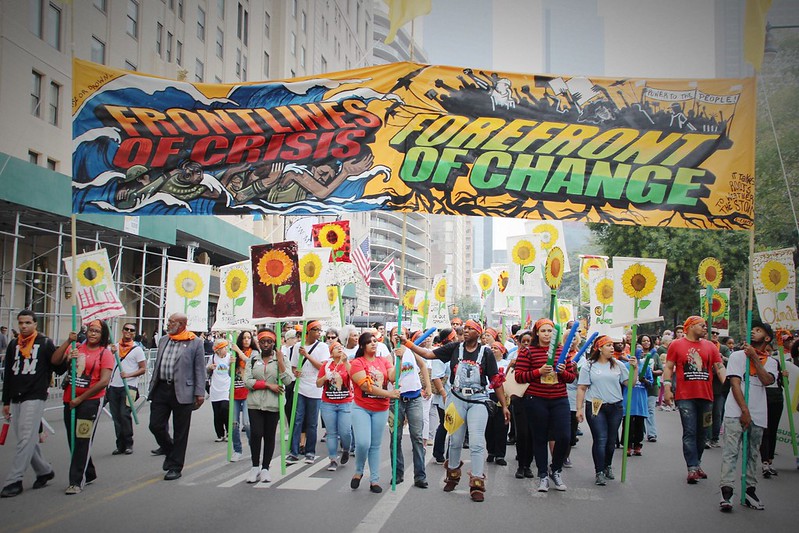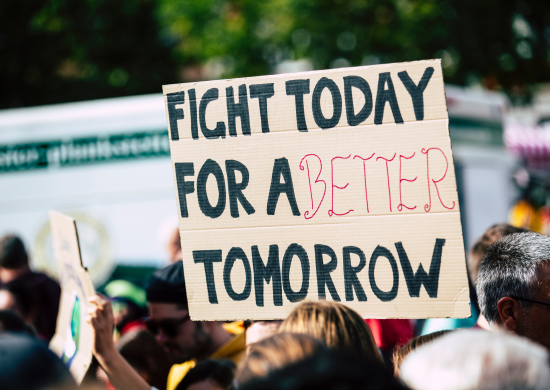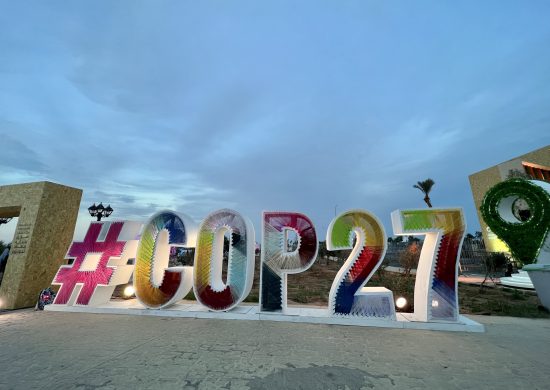In this second installment of our strategic refresh blog series, initiated by Pisces Foundation President David Beckman’s What we are learning blog, Climate and Energy Program Lead, Fanta Kamakaté, shares more about the Climate and Energy program’s plans to scale super pollutant mitigation while centering the communities most impacted by climate change and air pollution.
“I can’t breathe” – Eric Garner, 2014
“I can’t breathe”- Elijah McClain, 2019
“I can’t breathe”- George Floyd, 2020
These three words have been rallying cry at protests, painted on walls, and written on homemade signs. They powerfully encapsulate all the ways, from police violence to toxic air, that white supremacy chokes Black and Brown people and communities in the United States. They evoke experiences my own family and I share with many other people of color in this country as we face racism — systemic and otherwise — in our daily lives.
These experiences have undoubtedly shaped my career choices, particularly my work to mitigate super pollutants that contribute to toxic air, poor health outcomes, and increased vulnerability to the climate impacts many communities of color continue to face. These impacts are the results of the same systems that lead to disproportionate use of police force against the very same communities. Any real solution to climate change must contend with its systemic causes and unequal impacts. In this blog, I share why and how the Climate and Energy Program’s strategy at Pisces Foundation is evolving to scale and accelerate super pollutant mitigation as we center community leadership and power-building in all our efforts moving forward.
Tackling Super Pollutants and Addressing Equity
To meet the existential threat posed by climate change, we must now quickly reduce all of the pollutants driving it. Reducing super pollutants, such as methane from oil and gas production and black carbon from diesel vehicle exhaust, is essential to cool our planet and keep the global temperature under 1.5 degrees Celsius while saving lives. Super pollutants contribute significantly to deadly air pollution and speed up the rate at which the planet is warming. In the U.S., people of color are systematically exposed to dangerous air pollution, irrespective of where they live or their income. Breathing dirty air translates into higher asthma rates and increased incidences of heart and lung disease. Combined with other disproportionate burdens people of color face, such as lack of access to healthcare and police brutality, the outcomes are predictably unfair and tragic. Eric Garner’s death from an asthma attack triggered by a policeman’s chokehold is an example of these compounding impacts of systemic racism, as is the COVID-19 pandemic’s disproportionate impact on communities of color. Similar examples of these inequitable impacts exist around the world.
Since its inception, the Pisces Foundation’s Climate and Energy Program has prioritized efforts to mitigate super pollutants to avoid the worst impacts of climate change and save millions of lives from dirty air’s deadly effects. We are committed to this path, and now we are scaling and accelerating our super pollutant mitigation efforts to center just and equitable outcomes for the communities most impacted by air pollution and climate change.
Last summer, Pisces made a commitment to contribute to the movement to dismantle systemic oppression. This commitment was front and center as we carried out a triennial review of our programs in concert with a deeply facilitated diversity, equity, and inclusivity journey. Across the Foundation our continued focus is to embed equity in our core work, think about the whole systems we’re seeking to shift, and support movements.
Our commitments as a Foundation have supported me to incorporate more of my own lived experience belonging to and working in communities severely harmed by fossil fuels and the climate crisis as I lead the Climate and Energy Program. We recognized that although our program’s super pollutant lens has honed in on opportunities to address air pollution and near-term temperature change, we have not explicitly engaged the communities that have historically been most impacted by these issues, nor directly supported their advocacy and solutions.
Impacted communities have consistently advocated for the type of transformative solutions that are required to address the climate and air pollution crisis, such as the managed phase down of fossil fuels. Their advocacy also teaches us that the stringency of a rule’s requirement, its enforceability, and the accountability of all parties involved hinges on the political power of the communities demanding change.
 [Photo Credit: Rae Breaux, Climate Justice Alliance]
[Photo Credit: Rae Breaux, Climate Justice Alliance]
Our Refreshed Climate and Energy Strategy
In our refreshed strategy, our program aims to accelerate and scale super pollutant mitigation by centering community leadership and power-building in our support. There are three components to our strategy. First, policy advocacy is essential, and we are continuing to support it. Second, we are increasing our support to frontline movement-building organizations. Third, we are strengthening our approach to field-building overall to support the growing and diverse community of organizations addressing super pollutants.
To date, policy advocacy on super pollutants has resulted in significant wins for people and our planet, including one of the most ambitious global agreements to date to reduce climate change – the Kigali Amendment to phase down hydrofluorocarbon (HFC) — regulations to fix methane leaks in Canada and Mexico, a global pledge to reduce methane emissions, and standards to equip every new diesel truck and bus in the coming years with a filter that reduces over 90% of black carbon emissions in all key vehicle markets.
In the coming years, our policy advocacy work will focus on near-term opportunities to enact policies that significantly reduce methane emissions from oil and gas production in the U.S., eliminate black carbon from transportation, and accelerate the phase down of HFCs globally. These policies are essential, alongside CO2 reductions, to get the world on track to prevent warming from exceeding 1.5 degrees Celsius.
To increase our support to movement-building organizations, we are expanding our super pollutant-focused work to fund an ecosystem of movement organizations and networks whose durable solutions challenge a worldview that accepts emissions. We believe that achieving just and equitable outcomes for the most impacted communities will require more than supporting top-down policy proposals to clean up vehicle tailpipes and plug pipeline leaks. Where, when, and how these reductions happen matters.
To that end, we are entering partnerships with more organizations that are led by and accountable to communities disproportionately affected by the climate crisis in taking on the root causes of air pollution and climate change. Earlier this year, to support a field-wide approach to increasing resources to people of color-led environmental justice organizations, our Foundation became one of several inaugural signatories to the Climate Funders’ Justice Pledge, a shared commitment to funding transparency and increasing contributions to power building groups led by communities of color.
Our program contributes to field-building by convening grantees and supporting strategic communications to raise the profile of super pollutants in the media. As we scale up our commitment to eliminate super pollutants in our grantmaking, we also look to support other funders in increasing their commitments to groups taking fast action against super pollutants.
Committed to learning
We acknowledge that rapidly reducing emissions is just the first step in addressing the climate and air pollution crises. Super pollutants and their inequitable impacts are symptoms of systemic problems that rely on fossil fuel extraction, economic exploitation, and institutionalized racism. A systemic lens makes it clear that the movements for racial justice, environmental justice, and climate justice are interlinked.
We expect to learn a lot more as we implement this broader and more inclusive approach to address super pollutants. We will continue to seek feedback as we share our findings in future blogs. If you’d like to share your thoughts on our Climate and Energy Program’s strategic refresh, I encourage you to contact the Foundation at admin@piscesfoundation.org.
We believe this is how we build an equitable and just world where people and nature thrive together. We are committed to the journey to get there.



